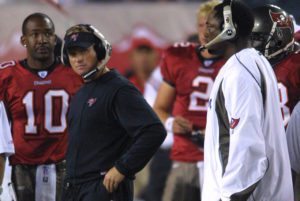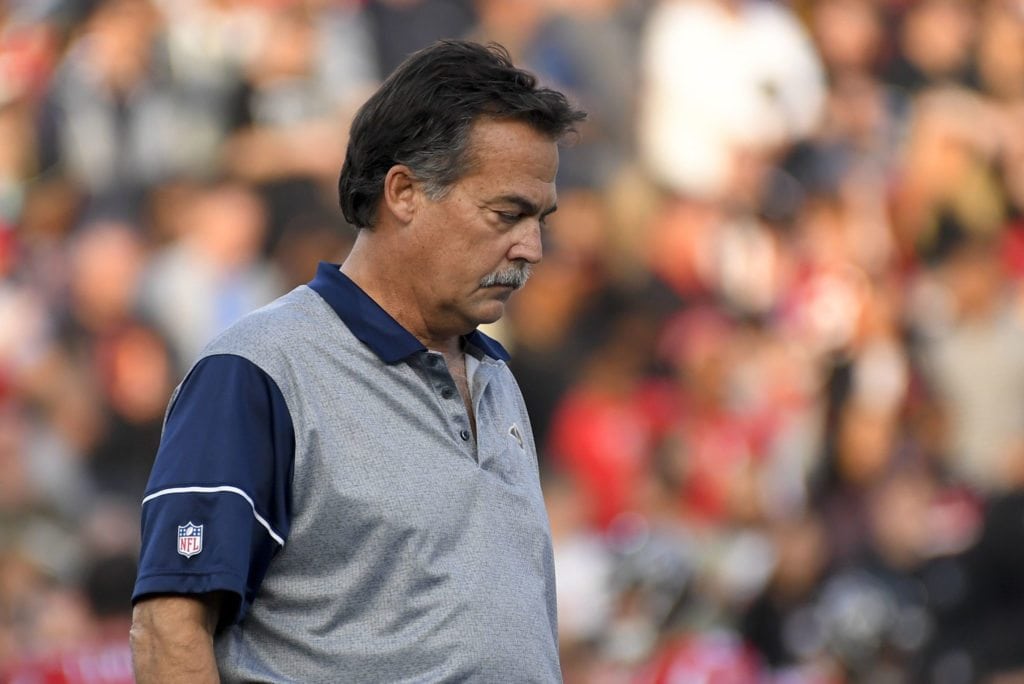SR’s Fab 5 is a collection of inside scoop, analysis and insight from yours truly, PewterReport.com publisher and Bucs beat writer Scott Reynolds. Here are a few things that caught my attention this week at One Buc Place and around the NFL.
FAB 1. What It Will Take For The Bucs To Make The Playoffs
It took the Buccaneers four decades to find a franchise quarterback in Jameis Winston.
Tampa Bay has a Pro Bowler in Mike Evans, who has had three consecutive 1,000-yard seasons and is destined to become the best receiver in team history.
The Bucs have a rejuvenated Doug Martin back in the fold and he is aiming to become the first running back in team history to have three 1,000-yard seasons in his Tampa Bay career.
But when all three had tremendous seasons in 2015 and Dirk Koetter’s offense reached 6,000 yards for the first time in team history, the Bucs only managed to win six games and the team’s head coach, Lovie Smith, was fired after two disappointing seasons.

Bucs RB Doug Martin – Photo by: Cliff Welch/PR
The growing popularity of fantasy football has heightened the star status of other offensive skill positions, but even in a league that has tailored its rules and its game to help the quarterback throw the ball defense still wins championships.
For Tampa Bay to make the postseason not only will Winston, Evans and Martin need to have good seasons, but Mike Smith’s defense will have to continue to improve for the Bucs to earn a playoff berth. History shows that in every year that Tampa Bay made the playoffs the defense also ranked in the top 10 in points allowed – except for the strike-shortened season of 1982, which we’re not counting in this research because NFL teams only played nine games that year.
The Bucs defense also ranked inside the top 10 in total yards, too with the exception of the 1981 season.
Bucs’ Playoff Defensive Rankings Points Allowed / Yards Allowed
1979 – 1st in scoring defense / 1st in total defense
1981 – 4th in scoring defense / 13th in total defense
1997 – 2nd in scoring defense / 3rd in total defense
1999 – 3rd in scoring defense / 3rd in total defense
2000 – 7th in scoring defense / 9th in total defense
2001 – 8th in scoring defense / 6th in total defense
2002 – 1st in scoring defense / 1st in total defense
2005 – 8th in scoring defense / 1st in total defense
2007 – 3rd in scoring defense / 2nd in total defense
Now take a look at the corresponding offensive rankings by the Bucs in their playoff years.
Bucs’ Playoff Offensive Rankings Points Allowed / Yards Allowed
1979 – 27th in scoring offense / 28th in total offense
1981 – 18th in scoring offense / 18th in total offense
1997 – 23rd in scoring offense / 29th in total offense
1999 – 27th in scoring offense / 28th in total offense
2000 – 6th in scoring offense / 21st in total offense
2001 – 15th in scoring offense / 26th in total offense
2002 – 18th in scoring offense / 24th in total offense
2005 – 20th in scoring offense / 23rd in total offense
2007 – 18th in scoring offense / 18th in total offense
Notice that the Bucs made the playoffs on the strength of the defense in every year, given the fact that the offense was in the bottom half of the league rankings in scoring offense in six out of eight playoff seasons. Tampa Bay’s offense never ranked higher than 18th in the league in total offense in any playoff season.

Bucs head coach Dirk Koetter and defensive coordinator Mike Smith – Photo by: Cliff Welch/PR
In case you were wondering, the Bucs finished 20th in the league in 2015 with Koetter as the play-caller, averaging just 21.4 points per game, despite finishing fifth in the NFL in total offense, averaging 375.9 yards per game. Last year with Koetter as head coach and play-caller, the Bucs slipped to 18th in the league in total offense, averaging 346.4 yards per game, while slightly improving to 18th in the NFL in scoring offense with a 22.1 points per game average.
History suggests that the Bucs offense is good enough right now to make the playoffs without much improvement – as long as the defense continues to make strides towards becoming a dominant unit.
In 2016, which was the first year with Mike Smith calling the defensive plays, the Bucs finished 15th in scoring defense, allowing 23.1 points per game. That was marked improvement over the previous season in which the Bucs gave up 26.1 points per game and ranked 26th in scoring defense.
Tampa Bay still has a ways to go in yards allowed after ranking 23rd last year, surrendering 367.9 yards per game. Houston was the top-ranked defense, allowing just 301.3 yards per game in 2016.
Last year, six of the 12 playoff teams had defenses that ranked in the top half of the league in total defense with four teams – Houston, Seattle, New England and the New York Giants – in the top 10. When it came to scoring defense, eight of the 12 playoff teams finished in the top half of the NFL with six teams – New England, the New York Giants, Seattle, Dallas, Kansas City and Pittsburgh – in the top 10.
It’s no surprise that New England, the team with the best scoring defense last year, won the Super Bowl. The Patriots allowed just 15.6 points per game last year – 10 points per game fewer than the Bucs did.

Bucs DT Warren Sapp and Tampa Bay’s 2002 defense – Photo by: Getty Images
Hall of Fame defensive tackle and Bucs legend Warren Sapp was famous for saying that if Tampa Bay’s offense could generate 17 points in a game that the defense would get the victory by holding the opponent to 16 points or less. That’s a tall order considering that offenses have evolved over the years and scoring is up across the league. But if Smith’s unit can improve to 10th in the league in scoring defense, which was 20.4 points per game last year, that should be good enough for Tampa Bay to make the playoffs.
Former Bucs head coach Jon Gruden once told me that total offensive and total defensive rankings don’t mean squat because yards don’t win games – points do. That’s true. Points scored offensively and points allowed defensively are the key stats and the true indicators of success, and that has held true over time in the years the Bucs have made the playoffs.
That leads us to a very relevant statistic, which is point differential. That is the number of the cumulative points scored and cumulative points allowed, subtracting the lower value from the higher. You might think that a team with a winning record automatically has a positive point differential, but you would be wrong.
Despite finishing with a 9-7 record in 2016, Koetter’s Bucs finished with a minus-15 point differential. That means that the Bucs defense gave up 15 more points than the offense scored last season.
In every year Tampa Bay has made the playoffs it has had a positive point differential. The largest favorable spread in team history came in 2002 as the Bucs had a plus-150-point differential thanks in large part to the league’s top-ranked scoring defense.
Positive Point Differential In Bucs’ Playoff Seasons
2002 – 150-point differential
2000 – 119-point differential
2007 – 64-point differential
1981 – 47-point differential
2001 – 44-point differential
1979 – 36-point differential
1997 – 36-point differential
1999 – 35-point differential
2005 – 26-point differential
The Bucs have also had three additional seasons with a positive point differential yet the team didn’t end up in the postseason.
Positive Point Differential In Bucs’ Non-Playoff Seasons
2008 – 38-point differential
2003 – 37-point differential
2010 – 23-point differential
Gruden’s 2008 season ended up with him getting fired despite going 9-7 and missing the postseason by a game. Raheem Morris’ Tampa Bay team went 10-6 in 2010, but also missed the playoffs by a game. In the 12 seasons in which the Bucs have had a positive point differential, only the 2003 season, in which Tampa Bay had a 7-9 record following the Super Bowl, resulted in a losing season.

Ex-Bucs head coach Jon Gruden and DBs coach Mike Tomlin – Photo by: Cliff Welch/PR
Point differentials can be tricky because a blowout win or two, or a couple of blowout losses, can really skew the perception that having a good point differential means success. A case in point was that Gruden’s 2004 team had a minus-3 point differential, yet went 5-11, while his 2006 squad went 4-12, but had a minus-142 point differential.
Greg Schiano’s 2012 Bucs team had a minus-5 point differential and finished with a 7-9 record as you might expect.
In case you’re wondering, the worst point differential in team history occurred in the winless 1976 season in which Tampa Bay had a minus-287 point differential in just 14 games.
One last defensive indicator as it pertains to the Bucs making the playoffs. The common denominator in all of Tampa Bay’s playoff teams is points allowed in a season. When the Bucs hold opponents to 280 points or less historically they make the playoffs.
Bucs’ Playoff Teams When Defenses Allow 280 Points Or Less
2002 – 196 points allowed
1999 – 235 points allowed
1979 – 237 points allowed
1997 – 263 points allowed
1981 – 268 points allowed
2000 – 269 points allowed
2007 – 270 points allowed
2005 – 274 points allowed
2001 – 280 points allowed
There have only been two seasons in which Tampa Bay’s defense collectively held opponents to below 280 points and didn’t make the postseason. That happened in 1978 when the Bucs went 5-11 after allowing 259 points, and in 2003 when Monte Kiffin’s defense held opponents to just 264 total points while Tampa Bay finished with an underachieving 7-9 record.

Ex-Bucs LBs Shelton Quarles and Derrick Brooks, CB Ronde Barber and SS John Lynch – Photo by: Getty Images
The Bucs have surrendered 300 points or more 26 seasons in the team’s history. Last year was one of those, as Smith’s unit allowed 355 of Tampa Bay’s 369 points (Winston threw two pick-sixes). Allowing just 280 points might be tall order in a day and age where scoring is on the rise. Pittsburgh, the league’s 10th ranked scoring defense last year, surrendered 327 points.
Smith’s defense isn’t far off, and was one of the league’s best scoring defenses over the last eight games where Tampa Bay’s defense allowed just 16.75 points per game. If the Bucs defense can pick up where it left off in 2016, Tampa Bay will return to the playoffs during the 2017 season.
Scott Reynolds is in his 30th year of covering the Tampa Bay Buccaneers as the vice president, publisher and senior Bucs beat writer for PewterReport.com. Author of the popular SR's Fab 5 column on Fridays, Reynolds oversees web development and forges marketing partnerships for PewterReport.com in addition to his editorial duties. A graduate of Kansas State University in 1995, Reynolds spent six years giving back to the community as the defensive coordinator/defensive line coach for his sons' Pop Warner team, the South Pasco Predators. Reynolds can be reached at: [email protected]



